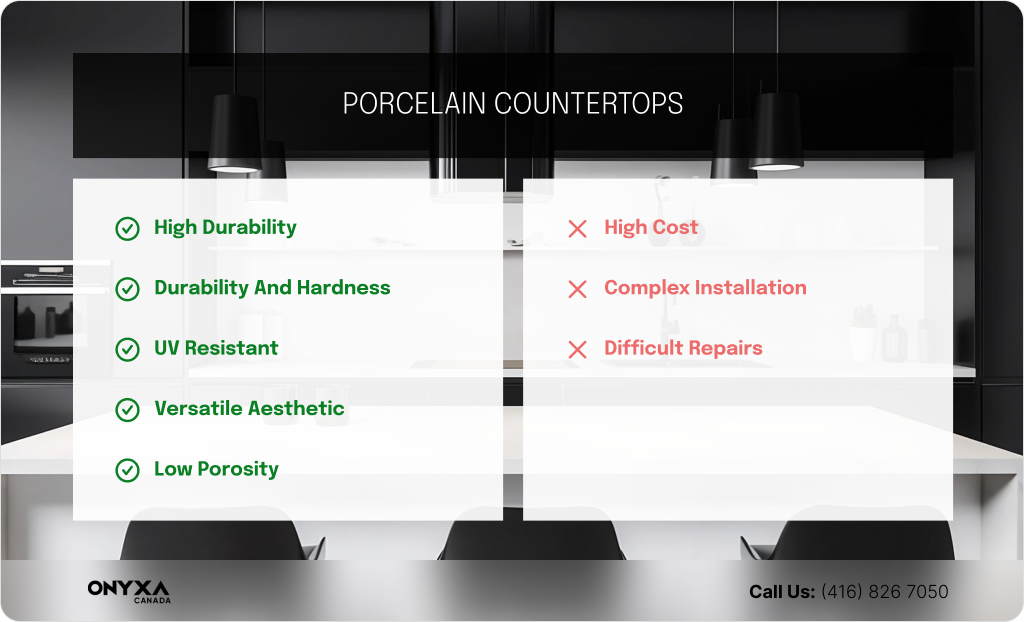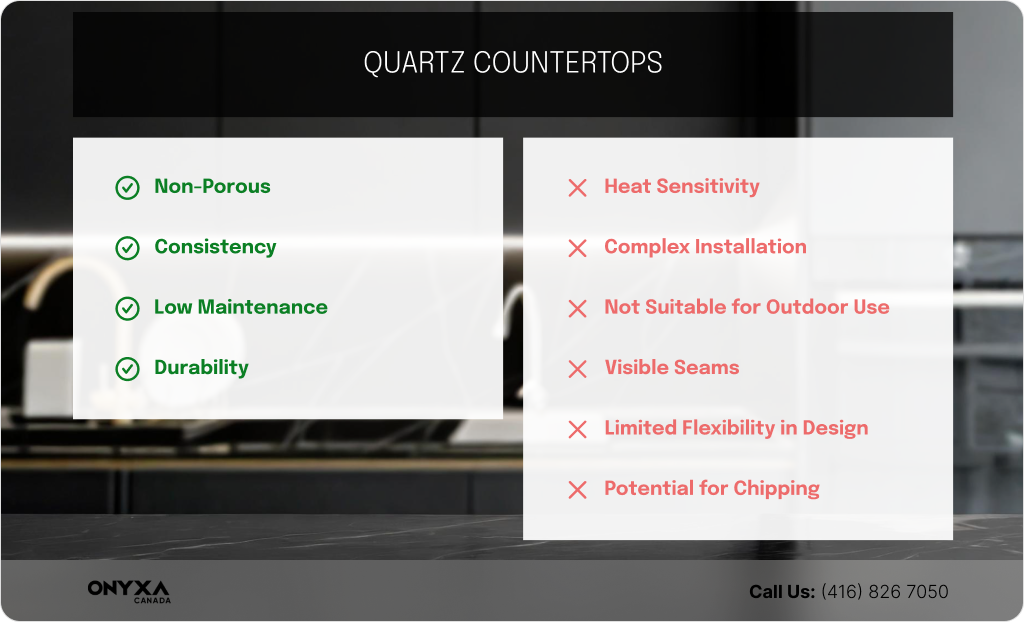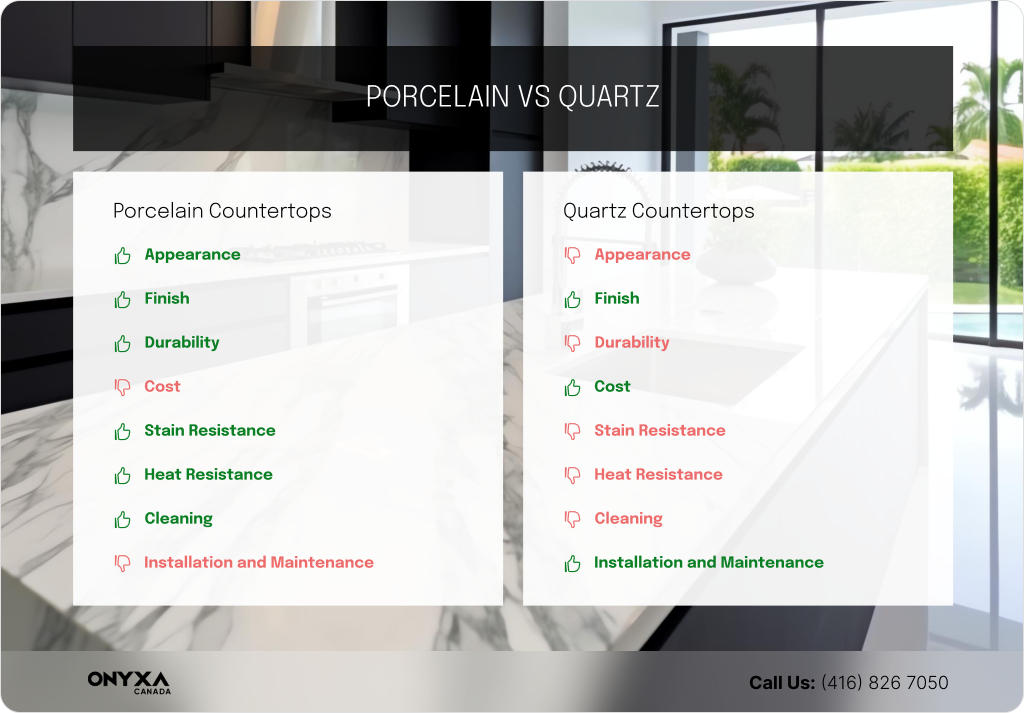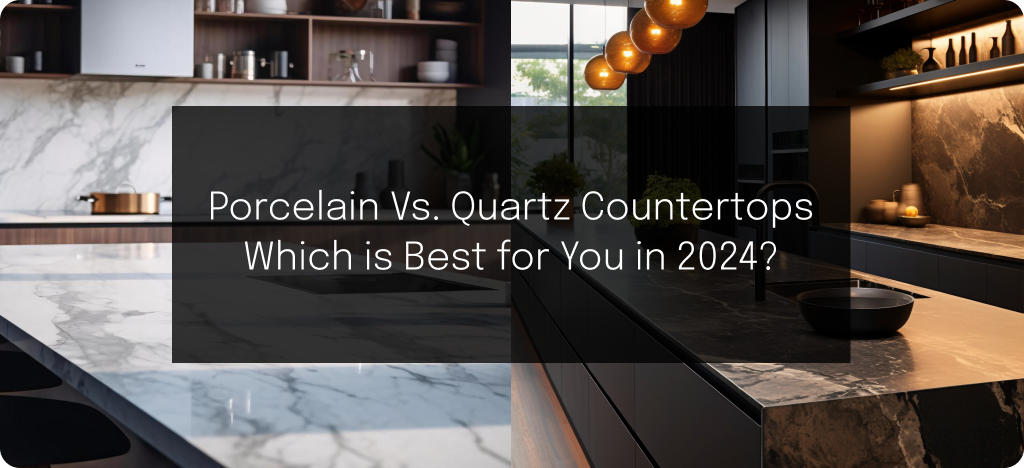Porcelain Vs. Quartz Countertops: Which is Best for You in 2024?
As we enter 2024, choosing the right material for your kitchen countertops is more crucial than ever. This choice impacts not only the aesthetics but also the functionality and longevity of your space.
The porcelain countertops vs quartz comparison continues to captivate homeowners and designers alike, each offering unique advantages and considerations. Whether you value the robustness and heat resistance of porcelain or the consistent beauty and ease of maintenance of quartz, aligning these features with your personal needs is key. Onyxa, a pioneer in high-quality porcelain slab and natural stone supplier, provides a comprehensive comparison to help you navigate this choice.
Porcelain vs. Quartz Countertops: as you ponder the heart of your kitchen’s functionality and the warmth it exudes for years to come, Onyxa stands as your guide, illuminating the path to the perfect countertop choice that resonates with love and life in your home.
What are Porcelain Countertops?
Porcelain countertops are crafted from a special type of clay mixed with natural minerals like kaolinite and silica; all fired up at incredibly high temperatures.
This process turns the clay into a tough, glass-like surface that’s super hard and much less porous than natural stone, making it great at resisting stains and wear. These countertops are tough enough to resist scratches and can handle hot pots without damage, making them perfect for kitchens and outdoor spaces. Thanks to their UV resistance, they also don’t fade in the sun, keeping their good looks year after year.
Porcelain countertops are versatile and stylish in various colors and finishes, fitting beautifully into any home decor while offering a long-lasting surface that stands up to busy daily life. This mix of practicality and style makes porcelain countertops a top choice for those looking to combine functionality with beauty in their home.
Pros and Cons of Porcelain Countertops
Porcelain countertops offer a sleek and durable choice for kitchens and bathrooms alike, blending high-end aesthetics with robust functionality. Here’s what makes porcelain an excellent choice for countertop material, along with some factors to consider:

Pros:
- High Durability: Porcelain is tough. It’s built to withstand heavy use without showing signs of wear and tear, such as scratches, cracks, and chips.
- Heat Resistant: These countertops won’t scorch or show heat marks when you place hot pans or pots directly from the stove or oven onto the surface.
- UV Resistant: Unlike many materials, porcelain doesn’t fade even under prolonged exposure to sunlight, making it ideal for both indoor settings and outdoor kitchens.
- Versatile Aesthetic: Porcelain offers endless creative possibilities. It can mimic the look of natural stone, wood, and other textures, allowing you to match any kitchen theme or color scheme while maintaining a high-end look.
- Low Porosity: The surface of porcelain countertops is less porous than natural stone, making them resistant to stains and bacteria, which promotes a hygienic kitchen environment.
Cons:
- Higher Cost: Due to its manufacturing process, porcelain can be more expensive than other countertop materials.
- Complex Installation: Porcelain slabs are heavy and require professional installation to ensure they are handled properly and avoid any potential cracking.
- Difficult Repairs: Although porcelain does not chip or crack, which is rare, repairing it can be challenging and often requires professional service to ensure the aesthetics are maintained.
What are Quartz Countertops?
Quartz countertops combine natural quartz—one of the hardest minerals on Earth—with synthetic resins and pigments. This manufacturing process results in a highly durable surface that is non-porous and consistent in color and pattern. The material’s composition ensures it does not absorb spills, making it easy to maintain. Available in various colors and designs, quartz countertops offer a practical solution for various settings due to their resilience and uniform appearance.
Pros and Cons of Quartz Countertops

Pros of Quartz Countertops:
- Non-Porous: Quartz countertops are non-porous, don’t absorb liquids, and resist staining remarkably well. This quality also means they don’t require sealing, a common necessity for natural stone surfaces.
- Consistency: One significant advantage of quartz is its consistency in color and pattern. This uniformity ensures that the piece you select in the showroom will match the slabs installed in your home, providing a cohesive look throughout your space.
- Low Maintenance: Quartz is incredibly easy to maintain. It can be cleaned with just a damp cloth and mild soap. The non-porous surface prevents bacteria and mold growth, making it a hygienic option for kitchens and bathrooms.
- Durability: Quartz is engineered to be robust, effectively resisting scratches, chips, and cracks. This makes it ideal for high-traffic areas and a practical solution for any active home.
Cons of Quartz Countertops:
- Cost: Quartz is pricier, with costs typically ranging from $40 to $100 per square foot. This price can increase significantly with more intricate designs, edge profiles, and installation complexities.
- Heat Sensitivity: High temperatures can damage quartz’s resin components. Placing hot items directly on the surface without protection can lead to discoloration and physical damage.
- Complex Installation: Quartz countertops require professional installation due to their heavy nature (approximately 20 pounds per square foot) and the need for precise installation. This process involves accurate measurements, proper leveling, and secure fitting, which adds to the overall cost and complexity.
- Not Suitable for Outdoor Use: Quartz is not recommended for outdoor installations as UV rays can cause the resin to fade and discolor over time, compromising the material’s appearance and integrity.
- Visible Seams: Seams on quartz countertops can be noticeable, particularly in lighter colors. These seams might collect dirt or debris, detracting from the seamless look and making cleaning more challenging.
- Weight: Quartz’s substantial weight makes it difficult to handle during installation and may require reinforced cabinetry to support the countertops adequately.
- Limited Flexibility in Design: While quartz is available in various colors and patterns, shaping and edge options can be limited compared to materials like natural stone. This can restrict design choices, especially for custom or complex countertop shapes.
- Potential for Chipping: Despite their overall durability, quartz countertops’ edges can chip if impacted by hard objects, which may be difficult to repair without noticeable mending.
Porcelain Countertops vs. Quartz Countertops

Choosing the right countertops for your home involves comparing options that combine durability, style, and practicality. Both porcelain and quartz are popular choices, but each has unique features that may sway your decision depending on your needs and aesthetics.
#1. Appearance
Porcelain countertops offer a wide range of design possibilities, capable of imitating natural stone, wood, and intricate patterns. This versatility allows porcelain to adapt seamlessly to any decor style, from classic to contemporary. Quartz countertops are also available in various colors and patterns but are prized for their consistent and uniform appearance, which suits those looking for continuity in design.
#2. Finish
Both materials come in finishes like polished, matte, and honed. Porcelain, however, allows for more diverse textural finishes that can mimic different materials such as concrete or rough stone, adding a unique character to each piece.
#3. Durability
Porcelain is remarkably durable and resistant to heat, UV light, and physical impacts, making it an excellent choice for indoor and outdoor use. Quartz is also strong but tends to be more susceptible to heat damage and may fade if exposed to direct sunlight over time.
#4. Porosity
Both materials are non-porous, making them excellent hygiene and maintenance choices. Porcelain and quartz countertops resist staining and do not require sealing, thanks to their non-porous nature achieved through different manufacturing processes.
#5. Cost
While the initial cost of quartz might be more appealing, porcelain countertops, though sometimes pricier, offer durability and aesthetic versatility that can provide long-term value, especially in high-use areas or in properties where design distinction is desired.
#6. Stain Resistance
Both options excel at resisting stains due to their non-porous surfaces. However, the composition of porcelain provides a slight advantage in terms of keeping the countertops pristine over many years of use.
#7. Heat Resistance
Porcelain takes the lead in heat resistance, capable of handling hot pots and pans directly on its surface without risk of damage—ideal for avid cooks or busy kitchens. Quartz requires more care to prevent heat-related damage.
#8. Cleaning
Cleaning both porcelain and quartz is straightforward, involving only mild soap and water. The ease of maintenance is a shared benefit, although the tougher surface of porcelain might edge out in longevity and resistance to harsh cleaners.
#9. Installation and Maintenance
Quartz offers easy installation and minimal maintenance, making it a convenient choice. However, while demanding careful installation to avoid cracking, porcelain offers a broader range of application possibilities beyond countertops, including large, seamless surfaces such as floors and walls.
Which Countertop Material is Right for You? Porcelain vs Quartz?
Choosing between porcelain and quartz countertops really boils down to what’s important for your home and lifestyle. If you’re looking for a countertop that can handle anything—from sunny outdoor kitchens to high-heat baking indoors—porcelain is likely your best bet. It’s tough, can take the heat, and has many unique designs and textures. On the other hand, quartz might be the way to go if you prefer something that’s easy to keep looking good day in and day out, with a consistent look across all your counters. It’s super easy to maintain and install without too much fuss. Think about how you use your space and what style makes you happy—that’s the best way to decide whether porcelain or quartz countertops are right for you.
Elevate your home with the beauty and durability of Onyxa’s porcelain slabs and natural stones. Your luxurious Toronto home is just a selection away. Let’s create something extraordinary together!
+1 (416) 854.8645
FAQs:
- Which countertop material is more durable, porcelain or quartz?
- Both materials are highly durable, but porcelain tends to have an edge due to its heat resistance and ability to withstand outdoor elements. Quartz is very durable but can be sensitive to excessive heat and prolonged sun exposure.
- Cost of porcelain countertops vs quartz?
- The cost can vary widely based on factors such as the installation’s complexity and the materials’ quality. Quartz can generally be more cost-effective, but high-end porcelain might be pricier.
- Can quartz countertops be used outdoors?
- Quartz can be used outdoors if it is adequately sheltered from direct sunlight and high temperatures. Ideal locations include covered outdoor kitchens, gazebos, or lounge areas where the material is protected from the elements.
- Which countertop material offers more design options?
- Porcelain countertops offer a wider range of patterns and textures, including designs that mimic natural stone, wood, and even concrete. Quartz provides a more consistent look, which is perfect if you prefer uniformity in your countertops.
- How do I maintain porcelain and quartz countertops?
- Both materials are easy to clean and maintain. Mild soap and water are sufficient for daily cleaning. Quartz does not require sealing, while porcelain’s hard surface makes it inherently stain—and scratch-resistant.
- Which is better for bathroom countertops, porcelain or quartz?
- Both are excellent choices for bathroom countertops. Quartz offers easy maintenance and consistent aesthetics, while porcelain provides a wider range of design options and is slightly more durable.
- Is porcelain better than quartz?
- Both materials have their advantages. Porcelain offers greater heat and UV resistance, making it better for outdoor applications, while quartz provides a more uniform appearance and is slightly easier to maintain.
- Are there any environmental considerations with either material?
- Both materials are generally considered environmentally friendly. Quartz uses natural minerals, although it is bonded with synthetic resins. Porcelain is made from natural clay and involves a more energy-intensive firing process, but it is completely natural and recyclable.
- Is porcelain countertops cheaper than quartz?
- Not necessarily. While basic porcelain options can be more affordable, premium porcelain designs and installations can exceed the cost of quartz.
